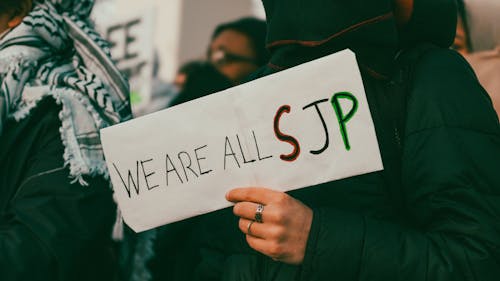SJP announces reinstatement, discusses experience with appeal process

On Wednesday, Students for Justice in Palestine at Rutgers—New Brunswick (SJP) announced its reinstatement after being suspended last month, according to statements from the organization and the University.
Though the organization has been allowed back on campus, it will remain under probation until the end of the calendar year, said its representatives at a press conference in the Graduate Student Lounge attached to the College Avenue Student Center on Wednesday.
Under the University's Standards of Conduct, probationary status serves as an acknowledgment of an organization's misconduct and sets expectations for future activities during the established probationary period. Organizations that infringe upon these expectations risk suspension and further disciplinary repercussions.
A statement from a University spokesperson clarified that the initial suspension was related to the organization's demonstrations in environments that either served educational purposes or were closed to the public.
"None of the (disciplinary) actions taken were based on speech," the University statement read. "The University strives to be a safe and supportive environment for all our students, faculty and staff while adhering to our commitment to free speech. We reject absolutely intolerance based on religion, national origin, race, ethnicity, gender, sexual orientation, ability or political views."
During a press conference addressing their current status on campus, SJP representatives said the University's support for its Palestinian students is insufficient. They spoke of instances where the administration's actions directly or indirectly contributed to the insecurity and fear Palestinian students experience on campus.
More specifically, the organization's spokespeople alleged that the administration labeled SJP as a danger, disseminated anti-Palestinian rhetoric and failed to respond appropriately to discriminatory acts rooted in Islamophobia and anti-Palestinian views. One speaker cited the University's lack of response to a shooting in November that injured three Palestinian college students in Vermont.
"Time and time again, we are put in harm's way by the Rutgers administration," an SJP representative said. "We have seen pro-Palestinian students harassed physically, verbally and emotionally all over campus. We have had our student-organizing leader doxxed. We have had threats of gun violence against us."
In a separate written statement, SJP critiqued the University's handling of the suspension, saying that it served as a means to further censor Palestinian voices on campus.
The statement read that the organization was made aware of its suspension when asked by a member of the press about the matter on December 12, rather than from the University directly.
Other students who tried to obtain more information about the suspension from other academic leaders were directed to resources that were often unusable, such as nonfunctional links and empty documents, according to the statement.
Nearly one week later, the organization began attending disciplinary meetings, despite not receiving any formal notice of the suspension directly from the University, the statement read. The statement documented one four-hour meeting in which an SJP member disclosed the killing of a family member to their conduct officer and was met with an apathetic response.
The University declined to comment on any remarks the organization made regarding the appeal process and the purported actions of the administration.
More broadly, SJP noted that the organization's suspension occurred at a time when its advocacy was most vital. The spokesperson added that the timing was particularly harmful for students of Palestinian descent, as SJP represents the community's primary on-campus presence.
The statement further read that the timing of the suspension was also tactical, given that it was issued during the designated period that professors administer final exams. Preparing and attending lengthy conduct meetings impeded on the organization's members' academic performances, the statement said.
During the conference and in their statement, the organization extended this critique of the University administration to University President Jonathan Holloway. The University's angling of Palestinian students to be hazardous and agitational suppresses their identity, the organization said.
"To President Holloway, we, Students for Justice in Palestine, are also your students," the organization's statement read. "We would like our university to treat us as students. We would like to be a part of your 'beloved community,' if you only let us in."
At the same time, SJP's leaders acknowledged the support of other organizations during the "We Are All SJP" social media initiative created in the wake of the suspension in overturning the University's decision. The movement saw the support of more than 150 student-led organizations, with a speaker adding that the group's Instagram post announcing the suspension received more than 25,000 likes.
"For the last three months, Rutgers University has shown that they will not uplift the movement — they will suppress it," an SJP speaker said. "But the students have shown that they will keep organizing for Palestinian liberation. The passion for justice that exists in the hearts of this academic community is enough to propel us through any obstacle and any oppression,"



